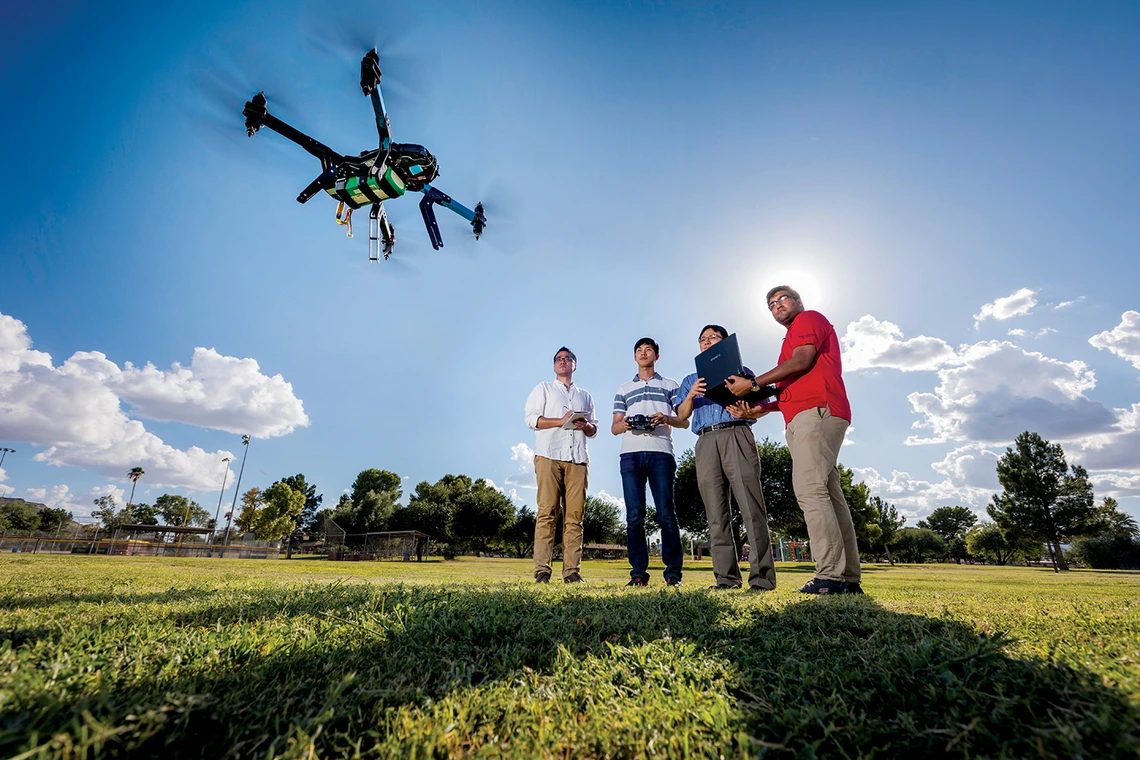Faculty and Staff Take on New Research and Professional Challenges

Congratulations to our faculty who have garnered great press, research grants and high-profile professional society positions in 2017.
SIE will host the 2018 INFORMS Annual Meeting, a conference on operations research and management Sciences, Nov. 4-7, 2018, in Phoenix.
The event attracts more than 5,500 attendants annually, and several SIE faculty and staff members have been working closely with the INFORMS staff and conference organizing committee, aiming to make the 2018 meeting outstanding.
Associate professor Roberto Furfaro is the new director of Space Situational Awareness-Arizona, an extension of the SOBS initiative that encompasses space object behavioral science, space domain awareness, and space traffic management.
In addition, Furfaro is the principal technical investigator on the Prototype Lunar/Mars Greenhouse project and is working with NASA researchers to develop long-term methods to sustain workers in space.
Assistant professor Neng Fan is involved in the Sustainable Bioeconomy for Arid Regions project, a five-year grant of up to $15 million from the U.S. Department of Agriculture's National Institute of Food and Agriculture, focusing on the mass production of biofuels and bioproducts in the Southwest. Fan will also continue efforts on the NSF-funded project, Collaborative Research: Automated Knowledge Discovery in Reliability and Health Care from Complex Data with Covariates.
As a team leader for theoretical analysis for optimization, Fan is also involved in UA-TRIPODS, an NSF-funded integrated research and educational institute in data sciences at UA, with a focus on theoretical foundations.
Assistant professor Vignesh Subbian, in collaboration with colleagues in the departments of Mathematics, Divisional Assessment and Research, and Mexican-American Studies, was awarded an NSF grant to identify critical challenges and opportunities regarding undergraduate science, technology engineering and mathematics education at Hispanic-Serving Institutions, or HSIs, in the Southwest. With support from this grant, Subbian co-chaired a regional working conference involving over 45 HSIs across five Southwestern states to develop ways to bolster their educational missions.
Professor Pavlo Krokhmal’s research in stochastic failures in complex systems, funded by U.S. Department of the Air Force grant, involves theoretical studies of uncertainties, risks and failures in complex distributed systems.
Another Krokhmal project, sponsored by the Defense Threat Reduction Agency and conducted with colleagues at the University of Pittsburgh, aims to elucidate the fundamental properties of cascading, domino-like processes in networks, such as propagation of failure due to large-scale attacks, and spread of disease.
Associate professor Wei Lin has been working on an NSF grant for a voting-based approach to data acquisition for traffic management systems. Lin's team anticipates that data collected by roadway-based infrastructure will be replaced by vehicle-based data, and his group is developing methods for drivers to interact with traffic control systems.
Young-Jun Son, professor and department head, and associate professor Jian Liu are principal investigators for a UA team designing an autonomous border-surveillance system that can collect, assess and act on data in real time -- and deploy drones on its own.
In addition, Son has been recently awarded a three-year grant from NSF, in collaboration with Qing He and Rajan Batta of SUNY Buffalo, to advance supply pre-positioning for emergency preparedness via integration of social media data and agent-based simulation.
Photo: Young-Jun Son, second from right, and PhD students from the Systems and Industrial Engineering Department flight test a drone.
